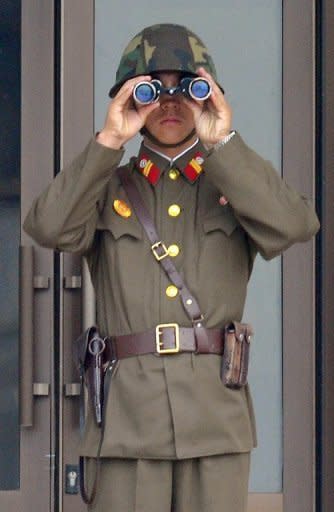N. Korea's new regime agrees with US on nuclear halt
North Korea has announced it will suspend its nuclear tests and uranium enrichment programme in return for US food aid, in a breakthrough less than three months after the death of leader Kim Jong-Il. Following talks with the United States last week, the regime led by Kim's young and untested son Kim Jong-Un late Wednesday promised also to suspend long-range missile tests and allow the return of UN nuclear inspectors. "Today's announcement represents a modest first step in the right direction," US Secretary of State Hillary Clinton told a Senate committee in Washington. "We of course will be watching closely and judging North Korea's new leaders by their actions." The talks in Beijing last week were the first between the two sides since Kim Jong-Un, who is in his late 20s, took power in late December. US analysts expressed cautious hope that the deal might portend a more conciliatory posture from Pyongyang, which has built up a costly nuclear programme despite suffering from dire food shortages and grinding poverty. But Republican critics in Washington warned that North Korea had spent years deceiving the West, and accused the US administration of reneging on repeated promises not to link humanitarian assistance to the nuclear issue. The United States said it would provide 240,000 tonnes of "nutritional assistance". A US official said Washington rejected a request for rice and grains and instead would provide vegetable oil, pulses and ready-to-eat meals designed for young children and pregnant women. "These are people whom the regime either cannot or has chosen not to feed," a senior official said in Washington on condition of anonymity. The North said it would allow the International Atomic Energy Agency (IAEA) to return to monitor the moratorium on uranium enrichment, which is one way of developing nuclear weapons. In Vienna, IAEA chief Yukiya Amano welcomed the announcement as "an important step forward" and said the agency's inspectors were ready to return. The deal was also welcomed by Foreign Minister Koichiro Gemba in Japan, one of six countries in talks on Pyongyang's nuclear weapons that also include China, the two Koreas, Russia and the United States. The Beijing discussions were aimed at persuading the North to return to the six-nation talks after it abandoned them in April 2009. It staged its second atomic weapons test a month later, following the first in 2006. North Korea in November 2010 publicly disclosed the uranium enrichment programme, which could give it a second way to make atomic weapons. Its longstanding plutonium programme is believed to have produced enough material for six to eight weapons. The North said the US side offered to discuss the lifting of sanctions and provision of light-water reactors to generate electricity, once the six-party talks resume. In a statement, State Department spokeswoman Victoria Nuland said US sanctions "are not targeted against the livelihood" of the North Korean people. Washington "reaffirms that it does not have hostile intent" towards the North and is prepared to take steps to improve the relationship, she said. The United States and North Korea reaffirmed their commitment to a September 2005 six-nation deal. This envisaged the North scrapping its nuclear programmes in return for major diplomatic and economic benefits and for a peace treaty formally ending the 1950-53 Korean War. There were widespread reports in December that the two sides were close to such a deal, but the sudden death of Kim Jong-Il threw the process into uncertainty. The new leadership headed by Jong-Un has taken a generally tough tone with the United States and South Korea, blasting their ongoing joint military exercises as a rehearsal for war. The US statement did not directly address tensions with US-allied South Korea. The United States has previously demanded that the North repair ties with the South before any progress between Washington and Pyongyang. Nuland's statement said the United States "still has profound concerns regarding North Korea's behaviour" but that the agreement reflects "important, if limited, progress in addressing some of these".





